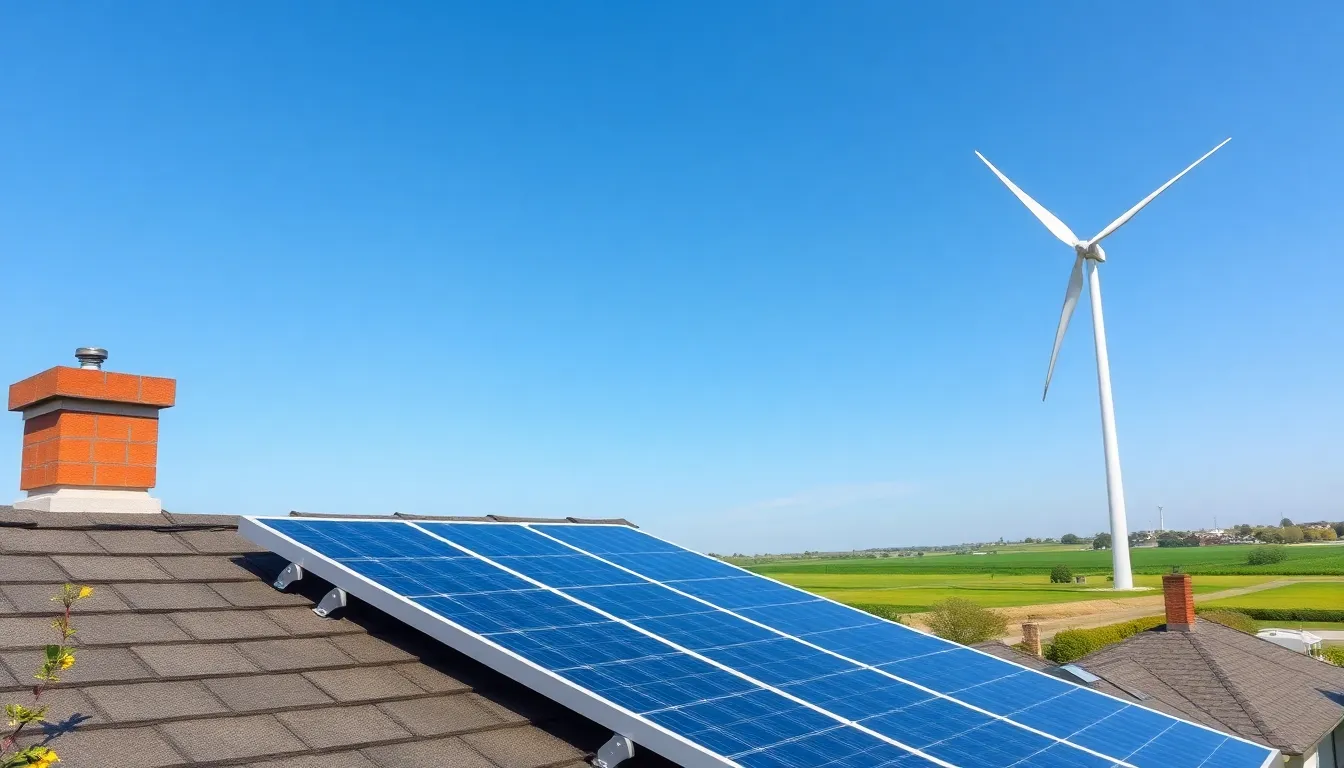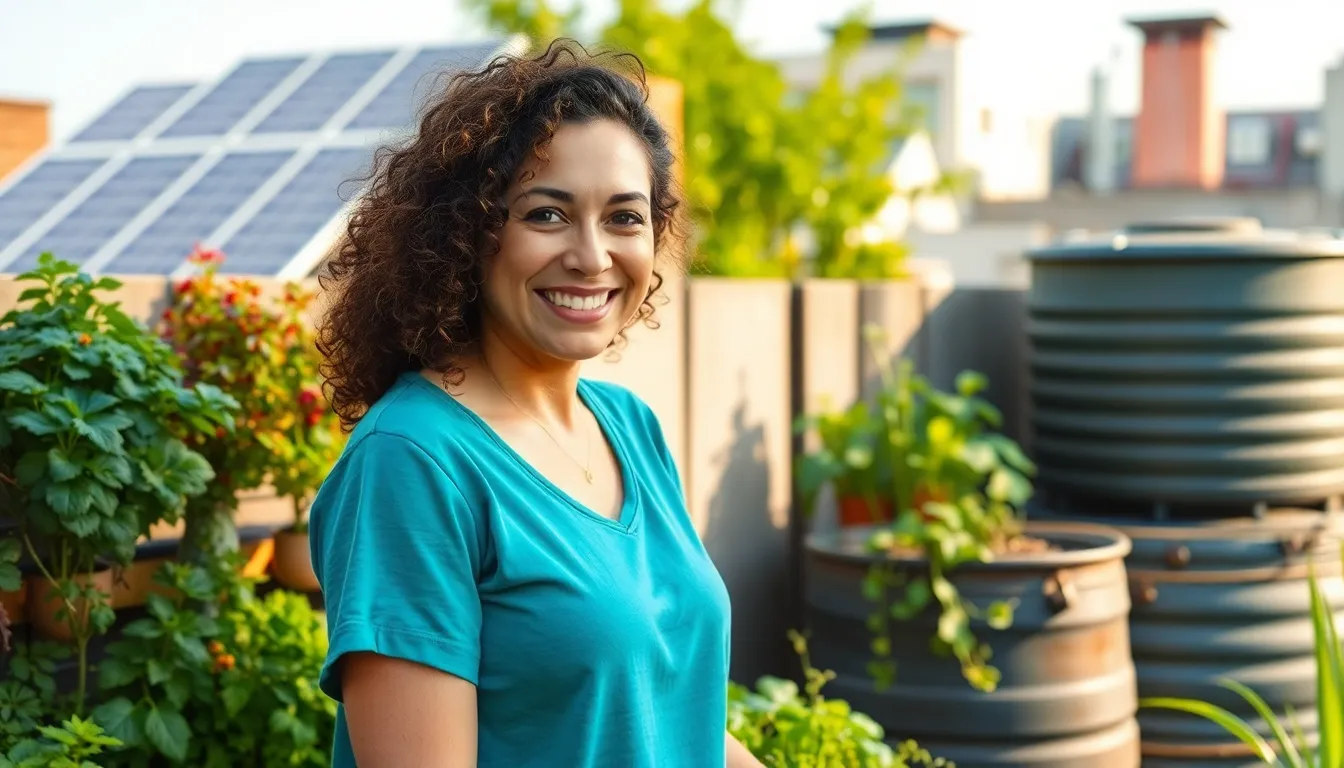Table of Contents
ToggleImagine a world where your morning coffee doesn’t just wake you up but also helps save the planet. Sustainable living innovations are transforming the way people interact with their environment, making eco-friendly choices not just necessary but downright exciting. From solar-powered gadgets to vertical gardens that could make even the tallest skyscraper blush, these innovations are here to make green living a breeze.
As the planet faces unprecedented challenges, embracing sustainability has never been more crucial. But who says it can’t be fun? With a sprinkle of creativity and a dash of technology, sustainable living is becoming a lifestyle that’s not only good for the Earth but also for the soul. Dive into the world of sustainable innovations and discover how small changes can lead to big impacts, all while keeping your sense of humor intact.
Overview of Sustainable Living Innovations
Sustainable living innovations encompass a range of technologies and practices designed to minimize environmental impact. Solar-powered gadgets represent a significant advancement. These devices harness renewable energy, reducing reliance on fossil fuels.
Vertical gardens also play a crucial role in modern sustainability. They utilize limited space efficiently, allowing urban dwellers to grow vegetables and herbs. Other innovations focus on water conservation. Rainwater harvesting systems collect and store rainwater for reuse, significantly lowering water consumption.
Smart home technology contributes to energy efficiency as well. Devices automate energy usage, optimizing temperatures and lighting according to needs. Many people adopt these smart technologies to lower electricity bills while supporting eco-friendly practices.
Composting systems further enhance sustainability efforts. These systems convert organic waste into nutrient-rich soil, decreasing landfill contributions. Cities and communities are increasingly implementing recycling programs, promoting waste reduction and resource recovery.
Innovations in transportation also support sustainable living. Electric vehicles offer an alternative to gas-powered cars, decreasing carbon emissions. Public transportation systems are evolving, prioritizing efficiency and affordability to reduce traffic congestion.
Eco-friendly building materials represent another innovation. These materials minimize environmental impact while enhancing energy efficiency in homes and commercial buildings. Green roofs and energy-efficient appliances boost home sustainability.
With numerous innovations available, individuals can make impactful choices. Engaging with these sustainable technologies fosters a healthier environment for future generations.
Renewable Energy Solutions

Renewable energy solutions play a critical role in sustainable living. They provide efficient ways to harness natural resources, driving significant environmental benefits.
Solar Power Advancements
Solar power advancements continue to revolutionize energy consumption. High-efficiency solar panels convert sunlight into electricity, providing more energy in smaller spaces. Innovations in photovoltaic technology reduce costs and improve performance, making solar energy accessible for households and businesses. For instance, building-integrated photovoltaics (BIPV) seamlessly incorporate solar cells into building materials. Effective storage solutions, like solar batteries, allow homes to utilize solar energy even when the sun isn’t shining. These developments contribute to a cleaner, renewable energy grid, resulting in lower greenhouse gas emissions and increased energy independence.
Wind Energy Innovations
Wind energy innovations enhance the efficiency of harnessing wind power. Modern wind turbines incorporate advanced materials and aerodynamic designs, increasing energy output while minimizing costs. Offshore wind farms are rapidly growing, taking advantage of stronger and more consistent winds at sea. Distributed wind generation also offers opportunities for rural areas to produce energy locally. Additionally, smart grid technologies integrate wind energy seamlessly into existing power systems, optimizing distribution. These advancements contribute to a sustainable energy future by reducing reliance on fossil fuels and promoting renewable energy sources.
Sustainable Transportation
Sustainable transportation plays a crucial role in achieving eco-friendly living. Innovations in this area help to reduce carbon footprints and enhance overall urban mobility.
Electric Vehicles
Electric vehicles (EVs) significantly contribute to lower greenhouse gas emissions. These vehicles utilize renewable energy sources, minimizing reliance on fossil fuels. In 2022, global EV sales surpassed 10 million units, marking a 55% increase from the previous year. Various manufacturers continue to develop longer-range models, reducing range anxiety for consumers. Innovations in battery technology enhance efficiency, resulting in faster charging times. Ultimately, widespread adoption of EVs encourages cleaner air in urban areas and decreases noise pollution.
Public Transit Improvements
Public transit systems enhance sustainability by reducing the number of individual cars on the road. Improvements include electric buses, which decrease emissions and offer quieter rides. According to the American Public Transportation Association, public transit prevented the release of 45 million metric tons of carbon dioxide in 2020. Expansion of dedicated bike lanes and pedestrian-friendly infrastructure encourages alternative modes of transportation. Implementing smart transit solutions, such as real-time tracking, enables users to efficiently plan their journeys. These advancements collectively promote greener urban environments and improve accessibility for communities.
Waste Reduction Techniques
Waste reduction techniques play a vital role in sustainable living by minimizing landfill contributions and promoting resource efficiency. Two key methods in this area include composting systems and upcycling practices.
Composting Systems
Composting systems convert organic waste into valuable compost. These systems can range from small indoor compost bins to large outdoor compost heaps. By diverting food scraps and yard waste from landfills, composting significantly reduces methane emissions. Nutrient-rich compost enriches soil, improving plant growth and health. Communities benefit from composting by participating in programs that facilitate organic waste collection. Education on composting encourages households to adopt this practice, making waste management more sustainable overall.
Upcycling Practices
Upcycling practices transform waste materials into creative and functional products. Various items, such as glass jars, old furniture, and textiles, can be repurposed instead of discarded. This approach reduces material waste while fostering creativity and innovation. Many artisans and DIY enthusiasts share their upcycling projects online, inspiring others to engage in waste reduction. By buying less and utilizing what they already have, individuals contribute to a circular economy that prioritizes sustainability. Upcycling fosters a sense of community, as people collaborate and share ideas on how to creatively use discarded items.
Water Conservation Methods
Innovative water conservation methods are essential in sustainable living practices. These approaches focus on maximizing water efficiency and reducing waste.
Rainwater Harvesting
Rainwater harvesting systems collect and store rainwater for various non-potable uses. This method significantly reduces the demand on municipal water supplies. Many households install barrels to gather rainwater from roofs, providing an excellent resource for irrigation and toilet flushing. According to the EPA, a typical roof can collect over 600 gallons of rainwater during a single storm. This strategy not only lowers water bills but also mitigates stormwater runoff, enhancing groundwater recharge. Incorporating such systems into residential or commercial designs promotes sustainability and efficient water use.
Greywater Recycling
Greywater recycling recycles water from sinks, showers, and washing machines for reuse. Unlike traditional wastewater, this source often contains minimal contamination, making it safe for irrigation and toilet flushing. Households can install greywater systems to redirect this water for irrigation purposes, reducing fresh water consumption by up to 50%. Utilizing recycled greywater supports water conservation efforts, especially in drought-prone areas. By rethinking water usage, individuals can achieve significant savings while promoting sustainable practices that protect vital water resources.
Sustainable living innovations are paving the way for a greener future. By embracing these advancements, individuals can make a positive impact on the environment while enjoying the process. From solar-powered gadgets to efficient water conservation methods, these creative solutions encourage a lifestyle that prioritizes sustainability.
As communities adopt these practices, the collective effort contributes to a healthier planet. The journey toward sustainability doesn’t have to be daunting; it can be engaging and rewarding. With every small change, people can inspire others to join in, creating a ripple effect that fosters a more sustainable world for generations to come.





